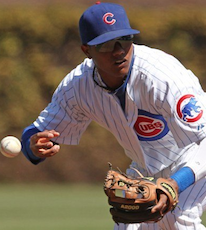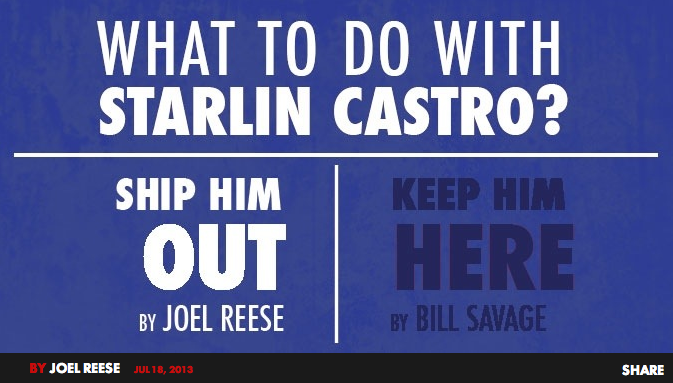Trade Starlin Castro Now
Trade Starlin Castro Now

Chicago Side
July 18, 2013

It’s been easy to blast Starlin Castro lately.
He committed a jaw-dropping seven errors over a recent 11-game span. His batting average in June was .167, and his average for the season is a woeful .243. He was recently “given a night off” to get his act together.
But I didn’t give up on him this week.
No, I gave up on him three months ago.
Here’s what happened: It was the April 9 night game against the Milwaukee Brewers, and it was fucking freezing. (I guess that’s neither here nor there, but it felt relevant at the time.)
The Brewers had the bases loaded in the second inning, and slugger Ryan Braun hit a routine grounder to Castro. Brewer Yuniesky Betancourt — not exactly Usain Bolt, he — took off from third for home. All it took was an easy throw and Castro had him dead to rights.
But Castro short-armed it, threw the ball like it was a dead halibut. It bounced in front of catcher Welington Castillo, he couldn’t come up with it, and Betancourt scored. E-6, yet again.
And that was it for me. I was done with Castro. “If a major-league shortstop can’t make a regular throw to home, then I’ve got no use for him,” I thought to myself.
I can imagine the blogosphere’s response, their chubby fingers angrily bashing on Cheetos-encrusted keyboards while mom patiently removes the crusts from their PB&J sandwiches upstairs. (I kid! I kid!) “It’s just one play! Small sample size!” “He’s only 23!” ”He had 529 hits over his first three seasons!” This is all true.
But Castro’s season is simply too brutal to overlook, and here’s what’s worse: He doesn’t seem to be getting better. Baseball players don’t necessarily improve in a linear fashion, and I’d love to think this is just a rough patch for the cherubic-faced Castro. But the numbers show this slide is a disturbing trend downward that’s been happening for a while.
Castro’s on-base percentage has slid every year he’s been in the majors, from .347 to .341 to .323 to its current .280 (yeesh). His strikeout percentage has increased from 13.4% in 2011 to 17.7% this year. Everyone assumed his power would increase, but he’s hit a mere six homers this season. His slugging percentage is almost 80 points below last year’s total.
Then there’s his fielding — ye gods, his fielding. His 14 miscues puts him in second place in the major leagues, and he’s either led MLB or finished second in that dubious category every year since 2010.
And his problems aren’t just at the plate or in the field—let’s not forget the embarrassing mental lapses over the years, including the time Mike Quade benched him because he was staring at the pretty unicorns flying over left field while James Russell pitched. The Cubs even brought his family over from the Dominican Republic to help him keep his concentration. Talk about handling a player with kid gloves.
There are other bothersome plays, too: lollygagging around third and getting rung up at the plate. Getting picked off second. Forgetting how many outs there were. (I mean, great googly-moogly, Starlin.)
Sure, I’m cherry-picking here. But when taken as a whole, we’re just not seeing a player whose arrow is pointing up.
Basically, here’s the bottom line: “Unless Castro is significantly better than the rest of season projections, he’s likely to finish the year as having one of the worst seasons by a Cubs position player since 2001,” as the thorough Cubs’ blog Obstructed View put it.
I’ve heard the Castro-based optimism that floats around Wrigley like the heady aroma of Old Style: He’s going to it together one of these days. He’s got limitless potential. He’s a key part of the team that’s going to win it all in 2015.
I don’t buy it.
At some point, a player is who he is. Are Castro’s impulsive, impatient tendencies going to suddenly stop? Is he suddenly going to wake up tomorrow and become a thoughtful, focused player? Probably not.
It’s similar to the delusional thinking we hear about Bears’ QB Jay Cutler (who’s 30, by the way). Sure, Cutler has a million dollar arm. But has been building around him for years, and here’s where Cutler has been ranked among NFL QBs since coming to Chicago: 20th (2012), 13th (2011—a season in which he only played 10 games), 16th (2010), and 21st (2009).
At some point, you can’t keep fantasizing about a guy’s endless potential and you have to face stark reality. Since Cutler arrived in Chicago, the Bears have won exactly one playoff game — a victory over the 7-9 Seattle Seahawks in 2010. (By the way, he played in Denver for three years and never got the Broncos to the postseason.)
Similarly, we starry-eyed Cubs fans want to keep hope alive with Castro. Every time he gets a hit, we think, “Hey, maybe this is where he turns it around!”
Unfortunately, there’s no evidence this is going to happen. As listed before, however, there is evidence to the exact contrary. And although the Cubs gave Castro a seven-year, $60 million contract last year, that regression is not a promising sign.
So Castro is struggling. We all see that. But there’s another question here: Whose fault is this?
It’s tempting to look at the Cubs’ braintrust and think they’ve tinkered with him too much. The new regime realizes the importance of walking, and getting Castro to work the count is like teaching an aardvark to fly. Castro’s 3.9 BB% is fourth-lowest in the National League (the batter with the worst? Ladies and gentlemen, Alfonso Soriano!). Walking just isn’t in Castro’s arsenal.
Initially, that wasn’t a problem: Castro seemed like a hitting savant, an Ichiro/Vlad type who could hit a line drive off any pitch — eight inches outside, over his head, in the dirt, wherever.
But the Epstein-era Cubs have put a premium on on-base percentage, and I can’t help but think Castro has heard that and is starting to doubt himself. He’s thinking too much at the plate, and his instincts are getting dulled. As a result, we’re seeing… well, this.
Or maybe he’s just regressing to his mean. Maybe he’s just coming back to who he is — an impatient hitter who’s a butcher in the field. Maybe he was never as good as we thought, and we pathologically hopeful Cubs fans thought he was the savior. He’s not, and he never was.
So if this is all the case: what should the Cubs do with him?
Simple: Trade him.
He’s likely attractive to some team that doesn’t pay as much attention to numbers. Or they’ll see that lightning-quick bat, the athleticism, and the sky-high potential, and they think they’re the ones who can turn him around. At this point, they probably won’t give up top-notch players — the window on getting a phenom in return has probably closed. But the Cubs will get something.
And who will play shortstop? Well, here’s one name: Javier Baez. You might have heard of him—he’s the 2011 draft pick who recently hit four homers in a game. Sure, he’s not perfect—he’s committed 30 errors this season (gah!) and, like Castro, seems allergic to walking. But he’s got the power Castro lacks, and was recently ranked number 15 in MLB.com’s Top 100 prospect list.
Some people think this administration might trade Baez, as Baseball Prospectus’ Jason Parks told the excellent Cubs’ blog Bleacher Nation. But even if that happens, the Cubs could undoubtedly find someone to fill Castro’s spot.
So that’s my call: Trade Castro yesterday. The Cubs are betting on the future. Castro has proven he shouldn’t be a part of it.